#q-force
Text
#the place where shows go to die indeed#how DARE they cancel lockwood and co i am killing and biting. this poll is made from RAGE#and you know they're going to announce big mouth season 10 and 12 more enola holmes movies#because how dare shows be made for reasons other than profits#lockwood and co#daredevil#iron fist#jessica jones#luke cage#tuca and bertie#i am not okay with this#ianowt#archive 81#q-force#the bastard son & the devil himself#half bad#warrior nun#paper girls#the irregulars#lucy carlyle#anthony lockwood#netflix#netflix how could you#netflix original#tumblr polls#edit: which cancelled netflix show (plus paper girls) was your favorite
4K notes
·
View notes
Text
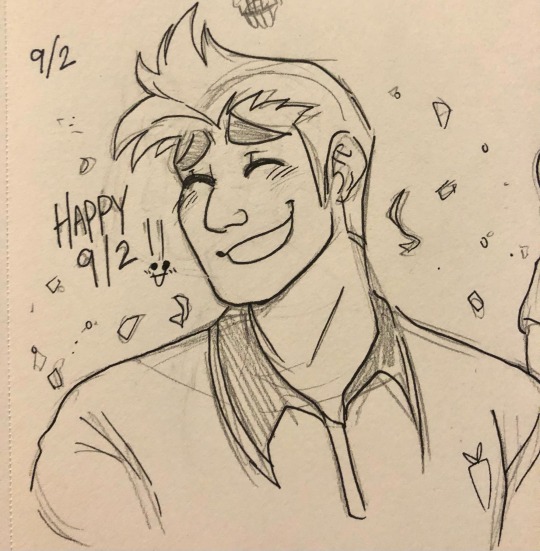


happy 2nd anniversary to q-force!
203 notes
·
View notes
Text
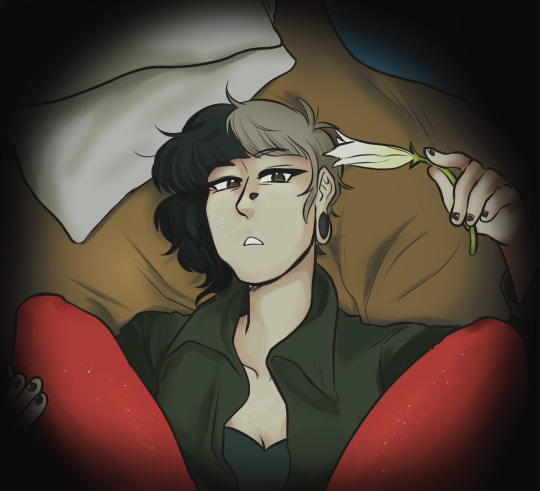
i miss you i miss you so much
everyday every night i wander
my heart and body’s dancing on the floor
my heart and body’s dancing on the floor
#drillart#q-force#q force#stat q force#suggestive cw in link SORRY I LOVE LESBO MUSIC#Aand i miss qforce and we know this. Its just that kind of time for me
84 notes
·
View notes
Text
#the dark crystal: age of resistance#the midnight gospel#dead end: paranormal park#q-force#tuca and bertie#inside job
174 notes
·
View notes
Text
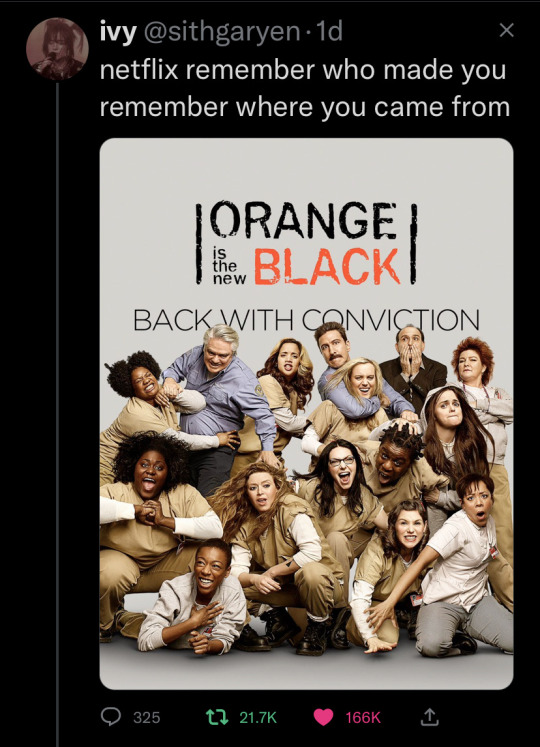
#netflix#warrior nun#teenage bounty hunters#first kill#q-force#i am not okay with this#everything sucks!#one day at a time#away#and so many others#we could’ve had so much rep
247 notes
·
View notes
Text
Fuck you hazbin hotel fuck you big mouth fuck you mindy kaling velma fuck you paradise pd fuck you f is for family fuck you q-force fuck you human resources fuck you helluva boss fuck you adult animation with no actual creativity or message behind it that banks on heavy swearing and ugly animation to distract from the fact its an absolute cesspit of vapid mediocrity fuck all of you I want a third season of Inside Job
#sometimes its cathartic to swing at the wasps nest#hazbin hotel#helluva boss#big mouth#velma#paradise pd#f is for family#q-force#human resources
16 notes
·
View notes
Text
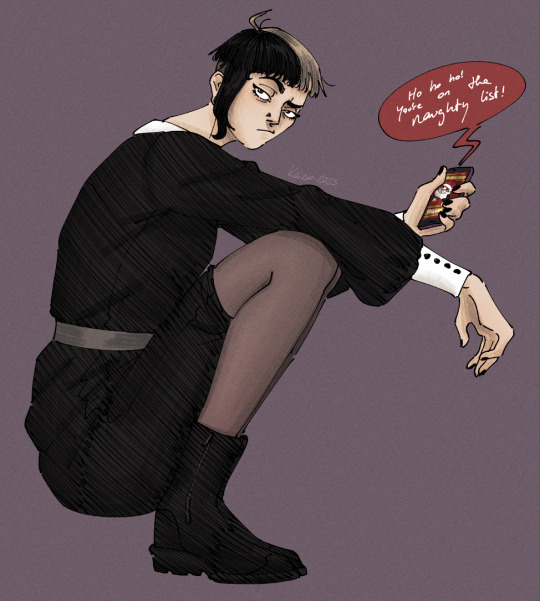
Comfort rewatched Q-Force and Stat is still best girl
#pls give the show a chance even if it's prob never gonna be picked up for a season 2 :')#Q-Force#QForce#Stat Q Force
80 notes
·
View notes
Text
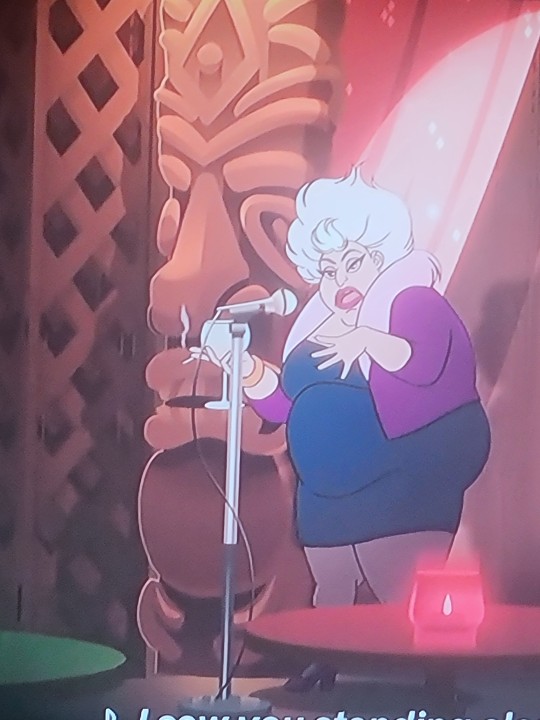
Does anyone else notice that this character from q-force looks like ursula from the little mermaid
Edit: In the comments, someone told me it was because ursula's design was based off of a drag queen, and I would like to say thank you🥰 to that person since I can't in the comments. 😔
9 notes
·
View notes
Text
take a shot every time a show with queer rep gets attacked for stereotyping but its really just how a lot of gay people have acted or looked at some point
#WOOO ALCOHOL POSIONING#dead end paranormal park#the owl house#q-force#i cant think of more but ik they exist
337 notes
·
View notes
Text
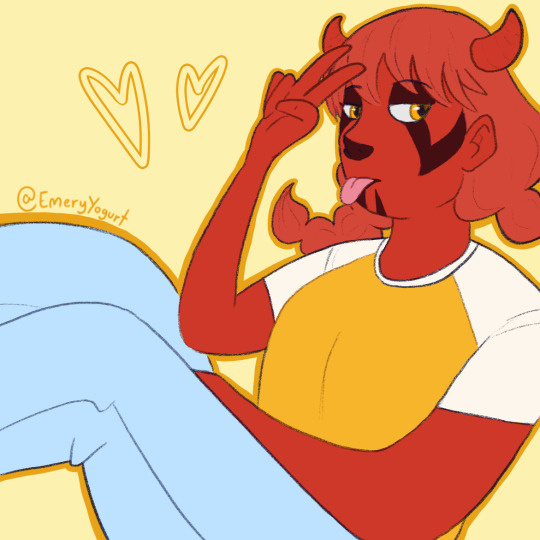
I Love You dot Com
52 notes
·
View notes
Text
ig everyone just kinda forgot about qforce. kinda sad
21 notes
·
View notes
Text
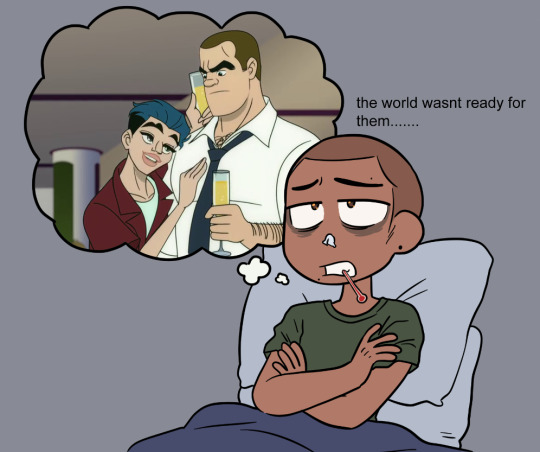
me for the past week
82 notes
·
View notes
Text
Booming LGBTQ Representation in Animation in 2021 [Part 1]
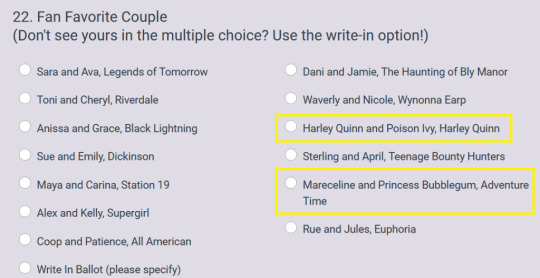
Two of the choices for “Fan Favorite Couple” in Autostraddle’s Annual Gay Emmys in September 2021 were in animated series. Both choices are highlighted here by yellow boxes.
In December 2020, I wrote that there is “hope in the future for diverse storylines and expanded representation,” adding that there is “a lot to look forward to in 2021 in terms of animated series…[which] will undoubtedly affect the ongoing war between streaming platforms for more subscribers, profits for themselves, and film distribution itself.” That still rings true, and 2021 has even more representation that I had imagined in December 2020, with continuing series like The Owl House, Disenchantment, Helluva Boss, Star Trek: Lower Decks, the third (and final) season of Final Space, and many others. The representation in 2021 is part of the “whirlwind” of LGBTQ representation which creator Noelle Stevenson described in November 2021.
Reprinted from Pop Culture Maniacs, my History Hermann WordPress blog on Jan. 15, 2023, and Wayback Machine. This was the seventh article I wrote for Pop Culture Maniacs. This post was originally published on January 5, 2022.
When Autostraddle, a digital lesbian culture publication, posted about their annual awards show, the Annual Gay Emmys, in September 2021, the influence of LGBTQ representation in animation was evident. [1] While most of the nominees for the categories were live-action series, there was an entire category dedicated to such series, “Outstanding Animated Series.” Harley Quinn, Blues Clues & You!, the “Obsidian” episode of Adventure Time: Distant Lands, The Owl House, “The Politics Episode” of One Day at a Time, and Magical Girl Friendship Squad were nominees. [2] The Harley Quinn episode “Something Borrowed,” was one of the nominees for the “Best Episode with LGBTQ+ Themes” category, and two couples in animated series were nominated for the “Fan Favorite Couple” question. When the results were announced Harley Quinn won for Outstanding Animated Series, although it was unfortunately the only animated series to win in a category. Of the series nominated, Magical Girl Friendship Squad and One Day at a Time ended in 2020, [3] Distant Lands ended in 2021, while three others are ongoing (Harley Quinn, Blue Clues & You!, and The Owl House).
Keeping this in mind, reviewer Jade King, in a review of The Owl House, said “we shouldn’t look toward giant corporations for continual queer representation.” While that still rings true, many of the shows with LGBTQ representation are produced and broadcast by such companies. For instance, of the over 20 Western animations noted in this article, almost all of them are produced by the subsidiaries of companies like Disney, WarnerMedia, NBCUniversal, ViacomCBS, and Sony, which bring in more than $1 billion a year. [4] The same is the case with many of the Japanese anime series noted in this post, which tend to have more LGBTQ representation, generally, than Western animation, although the instances of representation between Western and Japanese animation is slowly reaching the same level, and Japanese anime often plays into “many problematic aspects” and stereotypes in one way or another. King also pointed out that queer representation is not a competition, but should be a collaboration, rather than putting down one show while elevating another, arguing that “queer representation isn’t a linear path to acceptance. It’s messy and inconsistent.”
In 2021, shows on streaming platforms lead the way when it came to representation. Netflix tops the list in this regard, with shows like Disenchantment, Carmen Sandiego (to a lesser extent), and City of Ghosts. With Disenchantment, the show was described as “queer through and through,” with what some would call queer vibes throughout, had its third part air on Netflix in January of 2021. Recurring characters Odval (voiced by Maurice LaMarche) and Sorcerio (voiced by Billy West) were shown to be a gay couple, while there was an implied gay couple between Big Jo (voiced by LaMarche), and his assistant, Porky. Furthermore, Princess Bean, called a “rebellious, alcoholic, adventurous princess” by one reviewer, the show’s protagonist, voiced by Abbi Jacobson, was shown to be bisexual or pansexual. This is illustrated through her kissing the elf, Elfo (voiced by Nat Faxon), trying to have sex with various men, seeming to have feelings for Lady Bowmore (voiced by Tress MacNeille), female explorer, and falling in love with a mermaid named Mora (voiced by Meredith Hagner). This is further supported by the fact that Jacobsen is bisexual herself, making the representation that much more genuine. As for Carmen Sandiego, it was more implied than anything else. In February, in Instagram Live interview, Duane Capizzi, the showrunner of Carmen Sandiego, said that it was intentional that Le Chevre (also known as Jean Paul) and El Topo (also known as Antonio) were together, and confirmed them at a couple, calling them villains which are “sweet,” but you “can’t help but love.” [5]

Carmen Sandiego and Julia Argent in the Carmen Sandiego: To Steal or Not to Steal animated film
Some fans also speculated that protagonist Carmen Sandiego had feelings for Julia “Jules” Argent, called “Carulia” by fans, but that has not been confirmed by Capizzi or anyone on the show’s staff. Similarly, for City of Ghosts, the LGBTQ representation was subtle rather than outward like in Disenchantment. In the case of that series, Thomas, one of the show’s protagonists, a specialist of the Ghost Club and voiced by transgender child actor Blue Chapman, was non-binary, confirmed as such by show creator Elizabeth Ito. One episode of the series also showed a character with two mothers. The series, more broadly, was praised for its simple animation and characters, but having “strikingly complex” stories and background art which reflects the “realities of one of America’s richest cultural melting pots,” Los Angeles.
Disenchantment, Carmen Sandiego, and City of Ghosts were not the only Netflix shows with LGBTQ characters. The kids-oriented Ridley Jones also included such characters. The preschool animated series included a non-binary bison named Fred voiced by Iris Menas, and two characters (Aten and Kosi) voiced by Andrew Rannells and Chris Colfer, two openly gay actors. The series was created by Chris Nee, who created series like We The People and Doc McStuffins, both of which featured LGBTQ characters. Nee described herself as gay and “relatively butch” in an interview in 2021. Jacobson, who had voiced Bean in Disenchantment, voiced Katie, the protagonist of the animated film, The Mitchells vs. the Machines. In the film, she wears a pin with a rainbow flag and later is noted as having a girlfriend named Jade at film school, with the representation relatively subtle. More outward, in terms of the representation, were Chicago Party Aunt, which included a a gay man named Daniel, and Q-Force, which featured an assortment of LGBTQ characters. The latter series, which had caused great controversy and consternation online due to its use of stereotypes, features a gay protagonist named Steve Maryweather (voiced by Sean Hayes), a gay man named Benji (voiced by Gabe Liedman), a lesbian woman named Deb (voiced by Wanda Sykes), and a gay drag queen named Twink (voiced by Matt Rogers). A late-comer to this article was Arcane, the first part which aired from November 6 to November 20. Show writer Amanda Overton confirmed that Caitlyn Kiramman was a lesbian, saying that there is no word for gay or stigmatization against it in Piltover, meaning that Caitlyn could “marry any gender or race suitor,” but such a person would become “a part of her house.” Overton also said that the relationship between Caitlyn and Vi is “naturally developing,” with the trauma that Vi’s parents were killed by Enforcers, with Vi also confirmed as a lesbian as well. On Twitter, Overton said that everyone on the show’s crew is “working together to tell the same story.”
On November 25, 2021, the final season of F Is For Family, aired on Netflix. It included Louis, the gay brother of Sue, a character voiced by Neil Patrick Harris, an openly gay actor. It also included Ginny Throater, who divorces her husband, Greg Throater, and is bisexual, while Greg is gay, and divorces her as a result. Additionally, Eileen, Frank’s sister, is lesbian and becomes Ginny’s lover. The second and final season of the Netflix series, Centaurworld, premiered on December 7. It featured three gay characters: Zulius, Ched, and Splendib. Zulius, who was hinted to be gay in the show’s first season was confirmed as such in the second season, while Ched was revealed to be gay. Furthermore, Zulius is voiced by Parvesh Cheena, an openly gay actor.
Other than shows on Netflix, there were multiple series on other streaming platforms included LGBTQ characters. For instance, Volume 8 of RWBY, running from November 2020 to March 2021, which streamed on the Rooster Teeth website, featured a trans woman named May Marigold, who is voiced by a trans woman, Kdin Jenzen, a bisexual catlike woman named Blake Belladonna (voiced by Arryn Zech), and various lesbian characters. The latter included Ilia Amitola (voiced by Cherami Leigh) and a couple (Saphron and Terra Cotta-Arc) who have a child named Adrian. At the same time, the first season of Invincible, which aired on Amazon Prime from March to April 2021, included a gay recurring character named William Francis Clockwell, voiced by openly gay actor Andrew Rennells.
HBO Max, also owned by Warner Media like Rooster Teeth, featured a gay couple, Jonny Quest and Hadji Sing, in Jellystone!, while Young Justice, which focuses on young superheroes from DC comics, has a rash of such characters. Specifically, Kaldur’ahm/Aqualad (voiced by Khary Payton) is polysexual, while Marie Logan (voiced by Danica McKellar) is bisexual or lesbian, Eduardo “Ed” Dorado Jr. (voiced by Freddy Rodriguez) is gay, Violet Harper (voiced by Zehra Fazal) is genderqueer, Wyynde (voiced by Robbie Daymond) is gay, and Harper Row (voiced by Fazal) is bisexual. The second half of the fourth season of Young Justice premiered in late October of 2021 and aired until December 30, 2021. While Kaldur reappeared in the newest season and with speaking lines, characters such as Ed, Bart, Violet, and Harper either had no lines, were only pictured, or only their voices were heard. At the same time, Logan died in Season 2, Wynnde has not made an appearance. These are unfortunate developments.
The HBO Max preschool series, Little Ellen, featured same-sex couples, with a second part of season one released in October, while Summer Camp Island, which also airs on HBO Max, includes a non-binary couple (Alien King and Puddle) and two presumably gay ghosts. It was also implied in various episodes that Timothy Brice Campbell in the HBO Max series Close Enough was either gay or bisexual. The second and presumably final season of gen:LOCK premiered on HBO Max and it featured a genderfluid character named Val(entina) Romanyszyn. Her character was not only groundbreaking as a genderfluid character by smashing apart tropes attributed to such characters, but is voiced by a non-binary pansexual voice actor named Asia Kate Dillon. Val confirmed that she was pansexual in the same season and Robert Sinclair was shown to be gay, with a boyfriend named Chris.
© 2022-2023 Burkely Hermann. All rights reserved.
Continued in part 2
#lgbtq#autostraddle#animation#the owl house#disenchantment#helluva boss#star trek lower decks#final space#nd stevenson#carmen sandiego#bubbline#distant lands#carulia#to steal or not to steal#little ellen#gen:lock#close enough#centaurworld#q-force#city of ghosts#indie animation
56 notes
·
View notes
Text
I realize Lesbian rep is arguably rarer than queer male rep is and we need more lesbian rep overall
I still also wish we could have some more rep for queer men that doesn’t seem like we’re just comic relief jokes for straight people to laugh at
and that stories that include Bi characters would stop overwhelmingly behaving as if their same gender or queer romances are purely physical then depict their opposite gender cis heteronormative ones as “true love” and inherently “purer” than their queer ones
#lgbt representation#representation matters#the legend of vox machina#q-force#lgbtq#lgbt#sense8#the magicians#riverdale#the owl house#toh#Disney#amazon prime
112 notes
·
View notes
Text
youtube
(c) Regina Spektor
#carmen sandiego#samurai jack#dont starve#bojack horseman#lego monkie kid#lolirock#ducktales#code lyoko#the owl house#kaijudo#generator rex#adventure time#q-force#inside job#mep#ccs#Youtube
31 notes
·
View notes
Text
Twink kicks ass idk what yall were talking about
25 notes
·
View notes